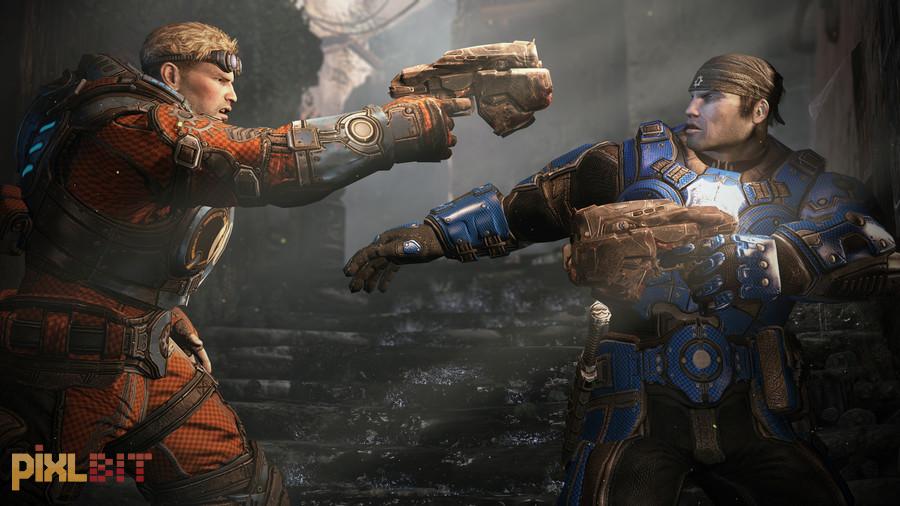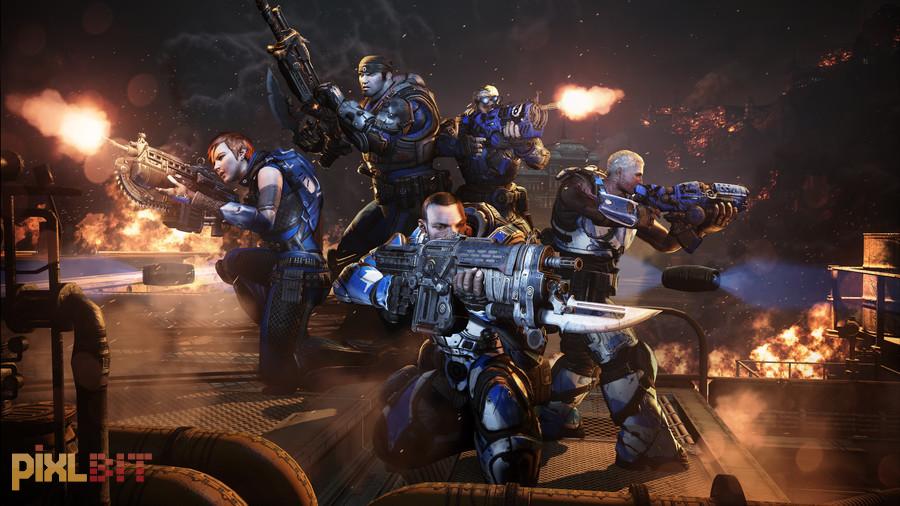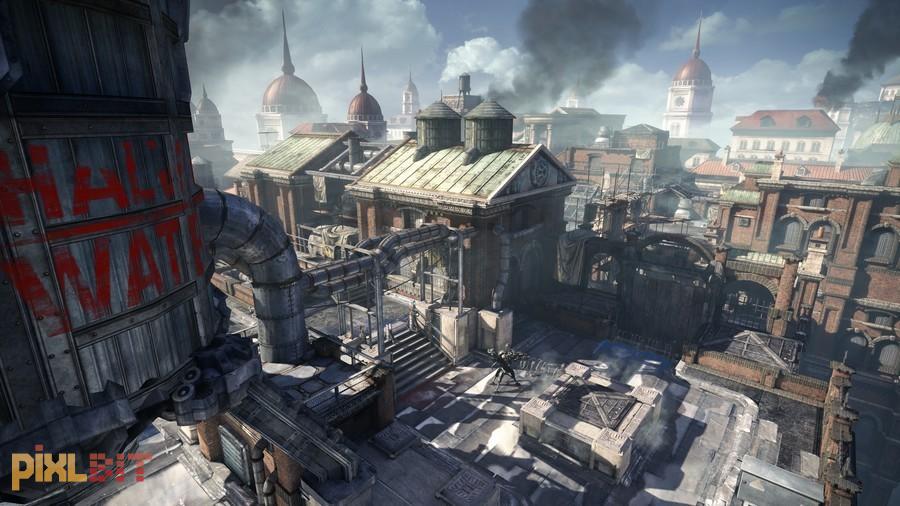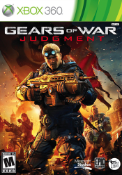Gears of War: Judgment Review
|
|
See PixlBit's Review Policies

On 04/19/2013 at 06:00 PM by Jon Lewis Grinded Gears |

For Die Hard Gears of War fans. For everyone else, it might serve best as a rental.
It’s safe to say that the Gears of War franchise has safely secured its place in people’s minds as one of this generation’s most important franchises. Since the beginning, they’ve been innovating and refining the 3rd person shooter genre, introducing things like the modern cover mechanic, and the extremely popular horde mode. 2011’s Gears of War 3 was the ending to the trilogy, and I felt like it ended the series properly. I finished the game satisfied with the story as well as the multiplayer, and I didn’t feel the need for another game. It’s not that I didn’t want the series to continue, but I expected a decent wait before the next iteration. It was hard for me to get excited for Gears of War: Judgment, a prequel starring the wise-cracking Baird. What could be done to improve upon Gears of War 3 less than two years later? Unfortunately, aside from a few changes in the overall formula, it’s apparent right away that developers People Can Fly couldn’t even answer that question.
Judgment centers on Baird, Cole, and two new characters: Sofia Hendrik and Garron Paduk. This team— also known as Kilo Squad— has been put on trial for crimes of war, and the story is told as each member of the squad retells the events that led them to their predicament in court. I felt like there was an opportunity here for the story to forge its own path, where it could shine despite the precedent set from the first three games. Unfortunately, the plot fell short for me. The events of the story were not as memorable or epic as I expected, and by the time the credits rolled, I felt extremely underwhelmed.
Nothing that I did in the story felt important to me. Even the unlockable Aftermath campaign that coincides with Gears 3 did little to provide any weight to the plot. With that said, I felt that the Aftermath was a lot more cohesive, and felt more like what I expect from the Gears franchise, unlike the regular Judgment campaign. That is because each mission of this campaign is split off as an instance that is broken up from the rest of the missions by a “success screen” at the end. Instead of the story just flowing, it feels broken up and encourages rushing through the plot rather than taking it as it comes.
One redeeming factor in the Judgment campaign would be the Declassified missions, which are symbolized by glowing Gears symbols on the wall at the beginning of each mission. These missions not only flesh out the story a bit more, but provide extra variety and challenge to each mission. These stipulations include things like hindered sight and limited ammo, which change the dynamic of each battle. Unfortunately, by campaign’s end, these stipulations seem recycled and unnecessary.
The Gears of War trilogy had a very distinct feel to it. Each game found ways to improve on the formula, while leaving the core mechanics intact, culminating in the fluid and responsive controls of the third game. Judgment shakes things up with some big changes to the controls. Weapon selection has been dialed back, and each character now only carries two weapons at any given time. Grenades now occupy a button on the controller, which speeds up their use in combat. Overall, this creates a more streamlined control scheme that doesn’t necessarily compromise the gameplay, but overall feels a bit forced. Aside from being able to switch weapons quicker and throw grenades a bit faster, I could barely tell the difference in the grand scheme of the gameplay.
Though the gameplay is still clearly Gears of War, it ultimately turns out to be the most boring entry in the series so far. Though the missions try to make things interesting with the Declassified stipulations, I quickly realized they got very repetitive and reused by the end. Adding in more variety to the declassified sections, especially by the end, would have made a lot of sense.
Adding to my boredom was the fact that this entry in the series simply doesn’t have any memorable events. Each of the previous Gears games had at least one or two set-piece moments that stuck with me after finishing the game, but after the final gavel strike of Judgment, I quickly realized that there was nothing special about it. With a series that traditionally had Epic attached to its name, it’s sad to see that this one was anything but.
Sadly, the mediocrity seeps into the multiplayer experience as well. While the core experience is similar, a few things have been changed to make the package feel a bit off compared to previous titles. The removal of the active-reload bonus and game modes like Horde and Beast mode definitely took me by surprise. Adding insult to injury, the game comes with only four maps, and asks that you purchase a season pass in order to get more lately down the line. While the season pass isn’t a bad deal, only four maps per mode does seem a bit sparse to me.
Even with less options in the box, the multiplayer is still fun. Playing with a group of friends always leads to great results. The maps themselves provide extra depth and verticality than before; it surprised me the first time someone dropped down from above to take me out with a shotgun. The game also hosts a great amount of unlocks, with the bulk being cosmetic costumes and skins. Playing and leveling up unlocks prize boxes, which will unlock a random weapon skin or costume for use in the multiplayer, which is a neat option for those interested.
As I said earlier, horde and beast modes have indeed been removed, but they have been replaced with Overrun, a hybrid of the two modes. In this mode, players control either the locusts or the COG as they either attack or defend themselves respectively. This time, unlike horde and beast mode, both sides are human controlled, and provide for an interesting dynamic. The COG is tasked with defending blocked up emergence holes, while the locusts are constantly attacking the COG defenses. This time around, the COGs have different classes: Soldier, Medic, Scout, and Engineer. These classes add a unique dynamic to the gameplay, as they each have unique abilities to bring to the table. This mode definitely stands out amongst the modes, although I didn’t find it as engaging or fun as horde.
Gears of War: Judgment provided more than I expected initially, but still came up short in the grand scheme of things. I was able to rave about previous entries in the series and can still easily recommend each of them. I have a hard time recommending Judgment, however. After playing this, I almost felt like I wasted my time, and I didn’t really gain much of anything from playing the game. While the game is still good, it’s easily my least favorite in the series. Unless you’re a hardcore Gears of War fan, or need to play the multiplayer I can’t really recommend buying this. At best, I’d say it’s a safe rent.












Comments